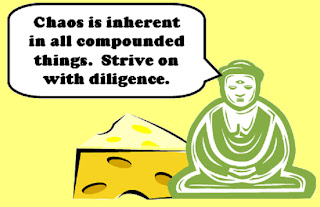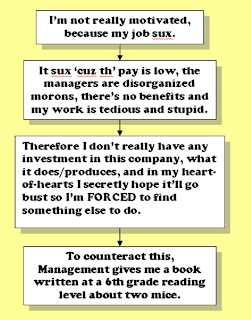http://www.inthesetimes.com/article/2122/Revenge of Global Finance
By SLAVOJ ŽIŽEK
When the final installment of the Star Wars series,
Revenge of the Sith, brings us the pivotal moment of the entire saga—the change of the “good” Anakin Skywalker into the “bad” Darth Vader—it aims to draw parallels between our personal and political decisions.
In a 2002
Time magazine interview, George Lucas explained the personal level through a type of pop-Buddhism: “He turns into Darth Vader because he gets attached to things. He can’t let go of his mother; he can’t let go of his girlfriend. He can’t let go of things. It makes you greedy. And when you’re greedy, you are on the path to the dark side, because you fear you’re going to lose things.”
But more resonant than how Anakin turned into Darth Vader is the parallel political question: How did the Republic turn into the Empire, or, more precisely, how does a democracy become a dictatorship? Lucas explained that it isn’t that the Empire conquered the Republic, but that the Republic
became the Empire. “One day, Princess Leia and her friends woke up and said, ‘This isn’t the Republic anymore, it’s the Empire. We are the bad guys.’ ” The contemporary connotations of this reference to Ancient Rome suggest the Star Wars transformation from Republic to Empire should be read against the background of Hardt and Negri’s
Empire (
from Nation State to the Global Empire).
The political connotations of the Star Wars universe are multiple and inconsistent. Therein resides the “mythic” power of that universe—a universe that includes a Reaganesque vision of the Free World versus the Evil Empire; the retreat of the Nation States, which can be given a rightist, nationalist Buchanan-Le Pen twist; the contradiction of persons of a noble status (Princesses, Jedi knights, etc.) defending the “democratic” republic; and finally, its key insight that “we are the bad guys,” that the Empire emerges through the very way we, the “good guys,” fight the enemy out there. (In today’s “war on terror,” the real danger is what this war is turning us into.) Such inconsistencies are what make the Star Wars series a political myth proper, which is not so much a narrative with a determinate political meaning, but rather an empty container of multiple, inconsistent and even mutually exclusive meanings. The question “But what does this political myth really mean?” is the wrong question, because its “meaning” is precisely to serve as this vessel of multiple meanings.
Star Wars I: The Phantom Menace gave us a crucial hint as to where to orient ourselves in this melee, specifically, the “Christological” features of the young Anakin (his immaculate conception, his victorious “pod-car” race, with its echoes of the famous chariot race in
Ben-Hur, this “tale of Christ”). Since Star Wars’ ideological framework is the New Age pagan universe, it is quite appropriate that its central figure of Evil should echo Christ. Within the pagan horizon, the Event of Christ is the ultimate scandal. The figure of the Devil is specific to the Judeo-Christian tradition. But more than that, Christ himself is the ultimate diabolic figure, insofar as diabolos (to separate, to tear apart the One into Two) is the opposite of symbolos (to gather and unify). He brought the “sword, not peace,” in order to disturb the existing harmonious unity. Or, as Christ told Luke: “If anyone comes to me and does not hate his father and his mother, his wife and children, his brothers and sisters—yes even his own life—he cannot be my disciple.” In order for there to be a properly unified “symbolic” community of believers, Christ had to first come and perform the Holy Spirit’s separating “diabolic” founding gesture.
Thus the Christian stance is radically different from the teachings of paganism. In clear contrast to the pagan wisdom that the universe is the abyss of the primordial Ground in which all “false” opposites—Good and Evil, appearance and reality, folly and wisdom, etc.—coincide, Christianity proclaims as the highest action precisely what paganism condemns as the source of all evil—the gesture of separation, of drawing the line, of clinging to an element that disturbs the balance of All.
What this means is that the Buddhist all-encompassing Compassion has to be opposed to the Christian intolerant, violent Love. The Buddhist stance is ultimately that of
indifference, of quenching all passions that strive to establish differences, while the Christian love is a violent passion to introduce a
difference, a gap in the order of being, to privilege and elevate some object above others. Love is violence not (only) in the vulgar sense of the Balkan proverb, “If he doesn’t beat me, he doesn’t love me!” The choice of love itself is already violent, as it tears an object out of its context and elevates it to the Thing. In Montenegrin folklore, the origin of Evil is a beautiful woman: She makes men lose their balance, she literally destabilizes the universe, coloring all things with a tone of partiality.
In March, the Vatican strongly condemned Dan Brown’s
The Da Vinci Code as a book that spreads false teachings (that Jesus married Mary Magdalene and that they had descendants, that the true identity of the Grail is Mary’s vagina). The Vatican especially rued that the book is so popular among the younger generation searching for spiritual guidance. The form of the Vatican’s intervention, which barely concealed a longing for the good old days when it could simply burn books, was obviously absurd. (Indeed, one almost suspects a conspiracy between the Vatican and the book’s publisher to give a fresh boost to its sales.) Nevertheless, the content of the Vatican’s message was basically correct.
The Da Vinci Code effectively re-inscribes Christianity into the New Age’s paradigm of seeking balance between masculine and feminine principles.
And—back to the
Revenge of the Sith—the price for the film’s sticking to these same New Age motifs is not only its ideological confusion, but, simultaneously, its inferior narrative quality. These motifs are why Anakin’s transformation into Darth Vader—the series’ pivotal moment—lacks the proper tragic grandeur. Instead of focusing on Anakin’s hubris as an overwhelming desire to intervene, to do Good, to go to the end for those he loves and thus fall to the Dark Side, Anakin is simply shown as an indecisive warrior who is gradually sliding into Evil by giving way to the temptation of Power, by falling under the spell of the evil Emperor. In other words, Lucas lacked the nerve to really apply his parallel between the shift of the Republic to Empire and of Anakin to Darth Vader. Anakin should have become a monster out his very excessive attachment with seeing Evil everywhere and fighting it.
Where, then, does this leave us? The ultimate postmodern irony is today’s strange exchange between the West and the East. At the very moment when, at the level of “economic infrastructure,” Western technology and capitalism are triumphing worldwide, at the level of “ideological superstructure,” the Judeo-Christian legacy is threatened in the West itself by the onslaught of New Age “Asiatic” thought. Such Eastern wisdom, from “Western Buddhism” to Taoism, is establishing itself as the hegemonic ideology of global capitalism. But while Western Buddhism presents itself as the remedy against the stress of capitalism’s dynamics—by allowing us to uncouple and retain some inner peace—it actually functions as the perfect ideological supplement.
Consider the phenomenon of “future shock”—the popular term for how people today can no longer psychologically cope with the dazzling rhythm of technological development and the accompanying social change. Before one can become accustomed to the newest invention, another arrives to take its place, so that increasingly one lacks the most elementary “cognitive mapping.” Eastern thought offers a way out that is far superior to the desperate attempt to escape into old traditions. The way to cope with this dizzying change, such wisdom suggests, is to renounce any attempts to retain control over what goes on, rejecting such efforts as expressions of the modern logic of domination. Instead, one should “let oneself go,” drift along, while retaining an inner distance and indifference toward the mad dance of the accelerated process. Such distance is based on the insight that all of the upheaval is ultimately just a non-substantial proliferation of semblances that do not really concern the innermost kernel of our being.
Here, one is almost tempted to resuscitate the old, infamous Marxist cliché of religion as “the opium of the people,” as the imaginary supplement of real-life misery. The “Western Buddhist” meditative stance is arguably the most efficient way for us to fully participate in the capitalist economy while retaining the appearance of sanity. If Max Weber were alive today, he would definitely write a second, supplementary volume to his
Protestant Ethic, titled
The Taoist Ethic and the Spirit of Global Capitalism.
Therefore, the true companion piece to
Star Wars III is Alexander Oey’s 2003 documentary,
Sandcastles: Buddhism and Global Finance. A wonderfully ambiguous indication of our present ideological predicament, Sandcastles combines the commentaries of economist Arnoud Boot, sociologist Saskia Sassen and the Tibetan Buddhist teacher Dzongzar Khyentse Rinpoche. Sassen and Boot discuss the gigantic scope and power, as well as social and economic effects, of global finance. Capital markets, now valued at $83 trillion, exist within a system based purely on self-interest, in which herd behavior, often based on rumors, can inflate or destroy the value of companies—or whole economies—in a matter of hours. Khyentse Rinpoche counters them with ruminations about the nature of human perception, illusion and enlightenment. He tries to throw a new light on the mad dance of billion-dollar speculations with his philosophico-ethical statement, “Release your attachment to something that is not there in reality, but is a perception.” Echoing the Buddhist notion that there is no self, only a stream of continuous perceptions, Sassen comments about global capital: “It’s not that there are $83 trillion. It is essentially a continuous set of movements. It disappears and it reappears.”
But how are we to read this parallel between the Buddhist ontology and the structure of virtual capitalism’s universe? The documentary tends toward the humanist reading: Seen through a Buddhist lens, the exuberance of global financial wealth is illusory, divorced from the objective reality—the very human suffering caused by deals made on trading floors and in boardrooms invisible to most of us. However, if one accepts the premise that the value of material wealth, and one’s experience of reality, is subjective, and that desire plays a decisive role in both daily life and neoliberal economics, isn’t it also possible to draw the exact opposite conclusion? Perhaps our traditional viewpoint of the world was based on naive notions of a substantial, external reality composed of fixed objects, while the hitherto unknown dynamic of “virtual capitalism” confronts us with the illusory nature of reality. What better proof of the non-substantial nature of reality than a gigantic fortune that can dissolve into nothing in a couple of hours due to a sudden false rumor? Consequently, why complain that financial speculations with futures markets are “divorced from objective reality,” when the basic premise of Buddhist ontology is that there is no “objective reality”?
The only “critical” lesson to be drawn from Buddhism’s perspective on virtual capitalism is that one should be aware that we are dealing with a mere theater of shadows, with no substantial existence. Thus we need not fully engage ourselves in the capitalist game, but play it with an inner distance. Virtual capitalism could thus act as a first step toward “liberation.” It confronts us with the fact that the cause of our suffering is not objective reality—there is no such thing—but rather our Desire, our craving for material things. All one has to do then, after ridding oneself of the false notion of a substantial reality, is simply renounce desire itself and adopt an attitude of inner peace and distance. No wonder Buddhism can function as the perfect ideological supplement to virtual capitalism: It allows us to participate in it with an inner distance, keeping our fingers crossed, and our hands clean, as it were.
It is against such a temptation that we should remain faithful to the Christian legacy of separation, of elevating some principles above others.












